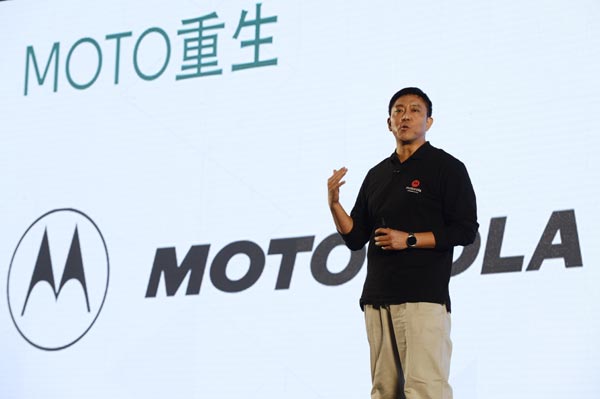Motorola drags down Lenovo brand
Updated: 2015-09-28 07:53
By MIKE BASTIN(China Daily)
|
|||||||||||
|
 |
|
Liu Jun, senior vice-president of Lenovo Group Ltd who heads the Motorola mobility unit, said in Beijing on Jan 26, 2014 that coming back to China and other emerging markets will help Motorola become profitable sooner. [Photo/China Daily] |
PC company needs to rethink strategy to turn things around for growth
Chinese global PC giant Lenovo continues to receive some of the most severely critical media coverage in its history. Not that surprising given that the company recently reported a 51 percent fall in first quarter profit to $105 million.
Even a rise in revenue, albeit a modest 3 percent, to $10.7 billion has been interpreted by large parts of the international media as "below forecasts".
But what has not been reported fully are the possible causes of this apparent downturn in the world's leading PC producer's fortunes, and the turnaround rebranding strategies that Lenovo are considering, and which could lead to a dramatic and sustained recovery.
Also not as widely reported is the pre-tax loss of $292 million in the three months to the end of June recorded for the mobile division, which appears to shine a spotlight on the root cause of Lenovo's recent profits plunge.
Lenovo reported recently that its PC business had reached a worldwide market share of 20.6 percent, with a 13-percent stake in the key US market, which increases the focus on the company's move into mobiles and the recent performance of its mobile division.
In response to news of its nosedive, Lenovo has acted swiftly and decisively. A major cost-cutting program with a short-term target of saving $650 million has already been launched. Cutting 3,200 jobs will play a big part in this radical project, and represents almost 10 percent of its nonmanufacturing employees worldwide and about 5 percent of its global workforce.
To gain sufficient understanding of Lenovo's competitive challenges it is necessary, as is often the case, to delve into the PC giant's past performance and strategic decision-making. In particular, it is most enlightening to expose the key reasons behind Lenovo's relatively rapid rise to global PC producer leadership.
Of course, the seeds were sown behind Lenovo's meteoric rise many years ago, but a quantum leap took place in 2005 with the audacious takeover of IBM's PC business. Crucially, the IBM acquisition included ownership of the corporate brand name, as well as already established and powerful product brands such as ThinkPad. Naturally, Lenovo paid handsomely for these brands, a not inconsiderable $1.25 billion, but also assumed an additional $500 million of IBM's corporate debt.
Despite the initial financial outlay, Lenovo benefited in numerous ways from this takeover.
While IBM's more advanced PC manufacturing technology and access to global markets are the most obvious, it is perhaps the far more intangible benefits such as the growth in confidence, ambition and self-belief that lie behind Lenovo's continued rise over many post-acquisition years.
Today's Top News
China unveils 600 South-South Cooperation projects
Xi's DC visit hailed as success
China pledges $2 billion to support South-South cooperation
Saudi stampede death toll rises to 769: Health minister
Xi, Obama outline joint vision to combat global climate change
Xi will get a bigger welcome in UK
China to create national carbon-trading market
Xi, Obama take aim at cybertheft
Hot Topics
Lunar probe , China growth forecasts, Emission rules get tougher, China seen through 'colored lens', International board,
Editor's Picks

|

|

|

|

|

|






